2022 Indian Chief Review - First Ride
Chief, Chief Bobber, and Super Chief
It’s all about the SPT says Brandon Kraemer, who’s spent the last three years of his life working on the new 2022 Indian Chiefs as Senior Product Director. People want Style, they want Performance, and they want Technology (even if many of them don’t quite realize they want that last one).
2022 Indian Chiefs
| Engine | 18.0/20 |
| Suspension/Handling | 12.0/15 |
| Transmission/Clutch | 8.0/10 |
| Brakes | 8.0/10 |
| Instruments/Controls | 4.5/5 |
| Ergonomics/Comfort | 8.5/10 |
| Appearance/Quality | 8.5/10 |
| Desirability | 8.5/10 |
| Value | 8.0/10 |
| Overall Score | 84/100 |
2022 Indian Chief Line First Look
And in this case, Indian’s gambling many of them just want less. The Chief Classic I rode around Texas in 2014 weighed 812 pounds with a 5.5-gallon fuel load, atop a 68.0-inch wheelbase. The new similarly equipped (bags and windshield) Super Chief weighs 739 pounds with 4 gallons of gas, Indian says, and rides on a 4-inch shorter wheelbase, with a seat just 26 inches from the pavement. That 70-pound weight difference feels like even more, maybe aided also by the optics of the thing: The new Chiefs just look much smaller than the outgoing models. The base Chief has a claimed weight of just 670 lbs wet.
Three new Chiefs (or is it six?):
Like Brandon said, people want performance. The bargain bikes get the 111-cubic-inch Thunderstroke V-Twin, rated by Indian at 108 foot-pounds of torque (and 105 on our dyno in 2018). The Dark Horses and the SC Limited get the 116-cid version, rated at 120 ft-lbs. And if you’re one of those people who already know you want the tech, going for the premium bike also gets you Indian’s new four-inch round TFT instrument display with Ride Command, for turn-by-turn nav, Bluetooth connectivity and all that modern jazz. Modern jazz also includes ABS, sadly, which will cost you $800 extra on a base Chief.
Every one of them comes with standard cruise control at your right thumb. Also, every new Chief represents a clean break at last with all that bulbous, valance-fendered, 100-years-old tailfin tradition we’ve come to expect. It’s about time.
New Steel Frame
In the quest for Style, behold the Chiefs’ all-new steel frame, a thing Indian’s proud enough of to repeatedly refer to as “a work of art.” In a video from designer Ola Stenegärd, somewhere in Europe, there are brief flashes of sparks from a grinder. “We wanted to capture a timeless look that never goes out of style, says Ola of the new steel frame, “and looks beautiful whether naked or fully dressed.”
At the time, that hydroformed aluminum chassis was a source of great engineering pride, but it was also meant to be mostly covered up. Indian will still sell you one of these Chiefs, which from now on will be known as an Indian Vintage. What’s new is old again.
Sweet Spot
That new frame is also going to be less expensive to manufacture than the aluminum one, which allows these new Chiefs to come one shelf down closer to Indian’s entry-level Scouts. Indian hasn’t really had anything to compete with Harley-Davidson’s Softail line-up. Now it does. And maybe it’s good timing, since some are still mourning the demise of the twin-shock H-D Dyna, which went away after 2018. Lots of V-Twin enthusiasts were big fans of that bike for its ease of modification. It’ll be even easier to swap shocks on the new Chief, our pal Jeff Holt points out: The fact that the shocks are mounted on studs means you don’t even have to fool with finding the right bolts and spacers.
“We also wanted to keep it simple enough to allow riders’ imaginations to take flight with personalization options and possibilities,” says Stenegard.
Shrinkage
Let us ride: Bobber Dark Horse
Other motojournalists and influencers on the Arizona launch last week, better at planning than I, had requested their choice of Chief ahead of time. I like to be surprised. That put me by default on a Dark Horse Bobber, which would have been a regular Bobber if Indian had brought any of the downscale 111-inch bikes along, which they did not.
They were thinking seriously of basing the new frame around the Challenger PowerPlus engine, but the cooling system requirements just didn’t meet the desired aesthetic, and so Thunderstroke it is. (Not that the PowerPlus couldn’t still happen; the prototype is reported to be a beast.)
It’s a great American-style V-Twin, really, and the Bobber is the lightest motorcycle you’ve ever experienced it in. Until you ride the Chief later anyway. Swinging a leg over, Sir Cathcart style, and grabbing a handful of throttle, the Bobber peels right out, especially in Sport mode and especially off the line – and the base Chief I rode later was still accelerating at an indicated 111 mph later on a long straight.
The Bobber goes around corners well enough, too, until the footpegs start grinding at what Indian tells us is 28.5 degrees of lean. Things remain nice and stable all the time thanks to 5.2 inches of trail. Well-chosen spring rates fore and aft keep the Bobber from too much bobbing whether you’re hard on the gas or the brakes. With the mini-ape handlebar, though, I felt like I was having to maintain pressure to keep the Bobber in the corner, or that feeling may have been due to the fat, 130/90-16 front tire. (Another downside of the wire-spoke wheels is that they require tubes.)
At 5’8, I’m not a fan of the mini-ape hanger handlebars or the Bobber’s forward-set footpegs at any speed above about 50 mph. But people on the taller side seem to like both those things. Which makes this a good time to segue into…
Modular design
All the different handlebars, windscreens and wheels are interchangeable between the three Chiefs (or six), and so is your choice of forward or mid-mount foot controls. There are also extended and reduced reach seats. You’ll even be able to add the TFT Ride Command clock to a base bike later if you want to (but that won’t be inexpensive, says Brandon Kraemer).
Super Chief
Not to be confused with the famed train from LA to Chicago, this one’s the touring version – with soft bags, a pullback handlebar and long rubber-mounted floorboards. The one I rode had the low windscreen which I assumed would be blustery annoying. Much to my surprise, it was really functional yet quiet, and Brandon Kraemer later told me how much time they spent perfecting it in the wind tunnel. Mid and tall quick-release screens are also available.
The Super Chief handlebar lets you sit mostly upright, and the rubber-mounted floorboards let you move your feet all over the place, which is key to long-distance comfort. With those things and cruise control, the Super Chief feels like it would be a superb cross-country road tripper minus the bulk of a real touring bike – sort of an American-style sport tourer. (American is another thing we’re told Indian buyers want, along with Simple and Mechanical.) The Super Chief’s claimed weight is fully 93 lbs less than the Challenger’s 832.
Handlebar risers are rubber-mounted on all the bikes too, and at 2800 rpm or so and 80 mph, all systems are smooth, especially on the Super Chief. The only thing I can think of that’s going to harsh your buzz on a nice road trip on the Super Chief is a roofing nail or drywall screw. Those wheels contain tubes. When I had a blowout on an Indian in Texas, the Harley dealer I got flat-bedded to would not help me. Sad. Okay, I can think of two things: The previous Chief was doing good when it got 35 mpg. With a four-gallon tank, range could be a problem.
Suspension
What you’re giving up a bit of for style and less weight is a little bit of suspension performance compared to the old aluminum-framed Chief or the Challenger. Where the old bike had a linkage-mounted single rear shock, the new steel frame also achieves a bit of rising rate via progressive springs on cantilevered twin shocks – but now there’s just 3.0 inches of rear-wheel travel instead of 4.5.
No worries as long as the road is smooth, and the new chassis does pretty okay over bumps too. But the occasional large bump, if you don’t see it coming and brace yourself, or if you’re short and on a bike with forward controls, will deliver a solid jolt to the spine.
All three models share the same 46mm fork and gas-charged shocks out back, with the premium models having the components covered in black shrouds for a heavy-duty custom look.
Chief Dark Horse
Mid-mount foot controls and a flat, drag-style handlebar define the non-Bobber Chiefs, along with the 19-inch front tire. (Indian says the 16-in front has the same overall diameter to make it easy on everyone who wants to swap wheels/tires.)
This one’s the hot rod of the bunch. The flat bar and mid-mount pegs rotate the rider forward into a more aggressive posture. And again, I’m not sure if it’s the handlebar or the 130/60-19 front Pirelli Night Dragon, or both, that make this Chief a more neutral-feeling, easier-handling bike than the Bobber. And that encourages you to wring its 116-inch neck all the time. Or could it be that the specs have the Chief weighing in 24 pounds lighter than the Bobber? Those fat tires and spoke wheels must be heavy.
The six-speed gearbox somehow feels less clunky than the ones in the big Indians, and you wouldn’t think a single 300mm disc would be enough for a 670-lb motorcycle when you’re trying to make time on curvaceous Arizona backroads. But it is, and it all hangs together in a package that’s sportier than it looks. Limited, again, by a slight lack of cornering clearance. Most Chief buyers probably won’t care about that; the ones who do can get a pair of longer shocks and slide the fork tubes down a bit.
And while the base Chief was my preferred bike for sporty riding, not so much for straightline droning. I think I want my Chief with the pullback handlebar from the Super Chief. With that and the mid-mount pegs, it would be nice and easy to see the cattle guards well in advance in order to stand up and defend the coccyx.
Indian is Still on a Roll
Customer satisfaction is up, we’re King of the Baggers, masters of flat-track, gaining market share in all major markets (up 3.5 points in the USA), say all the Indian executives. Hell’s bells man, we’re up 5.7% in China, and have a 25% big-bike market share in Japan! The Scout is on fire, they say, and we needed a progression point for move-up buyers; the new Chief is hugely important in that big middle chunk of the American V-Twin market.
How ironic. To build a modern Indian Chief, all it took was to revert back to a simple steel frame laid out along smaller dimensions much like the original from a century ago. Throw in a little modernity: Keyless ignition, Ride modes, cruise control, rear cylinder deactivation and LED lighting are found on every model. It just goes to show you how dumb people weren’t 100 years ago.
And in addition to the modular design (I’d need the Super Chief with cast wheels), this one was designed to be modified by its owner. Indian has a slew of accessories as you’d expect, including engine upgrade kits. All in all, it looks like Indian may have another winner on its hands.
2022 Indian Chiefs
+ Highs
- Light makes right
- Modular design means everyone can fit
- 108+ ft-lbs @ 3000 rpm means it’s time to go right now
– Sighs
- Prices creep up quickly
- Tubes? Seriously?
- 3 inches rear wheel travel beats a hardtail
In Gear
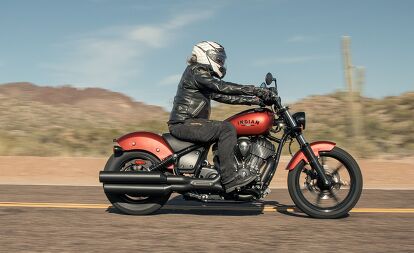
Helmet: Shoei Neotec 2 Splicer $799
- Jacket: Vanson AR3 $562.50
- Gloves: Alpinestars Belize Drystar $180
- Jeans: Trilobite Parado Elastic Men’s Jeans $219
Boots: Sidi Arcadia Tex $179
2022 Indian Chief Specifications | |
|---|---|
| MSRP | $14,499 – 21,499 |
| Engine Type | 1811 (111 cubic inches) / 1890 cc (116 ci) air-cooled 49-degree V-Twin, OHV, four valves per cylinder |
| Bore and Stroke | 101mm / 103.2mm x 113mm |
| Compression Ratio | 9.5:1 / 11:1 |
| Torque | 108 lb-ft @ 3200 rpm / 120 lb-ft @ 2900 rpm |
| Transmission | 6-speed |
| Final Drive | Belt |
| Front Suspension | 46mm fork; 5.2 in wheel travel |
| Rear Suspension | Dual shocks, adjustable spring preload; 3.0 in wheel travel |
| Front Brake | Single 300mm disc, four-piston caliper, ABS (optional on base models) |
| Rear Brake | Single 300mm disc, 2-piston caliper, ABS (optional on base models) |
| Front Tire | 130/60B19 / 130/90B16 |
| Rear Tire | 180/65 B16 |
| Rake/Trail | 29° / 5.2 in (131.5 mm) |
| Wheelbase | 64 in (1626 mm) |
| Seat Height | 26 in (662 mm) / Super Chief 26.2 in (665 mm) |
| Curb Weight (Claimed) | Chief, 670 lb / Bobber, 694 lb / Super Chief, 739 lb |
| Fuel Capacity | 4.0 gal. |
| Colors | Lots |
| Warranty | 2 Years, Unlimited Miles |
We are committed to finding, researching, and recommending the best products. We earn commissions from purchases you make using the retail links in our product reviews. Learn more about how this works.
Become a Motorcycle.com insider. Get the latest motorcycle news first by subscribing to our newsletter here.
More by John Burns



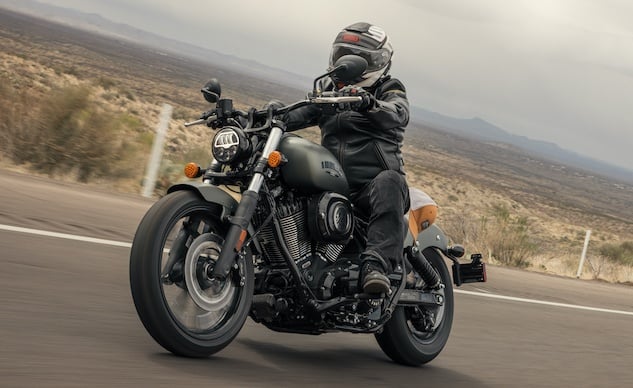























































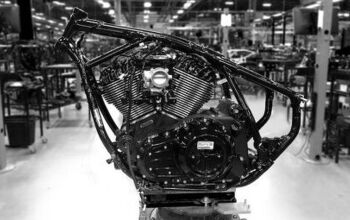
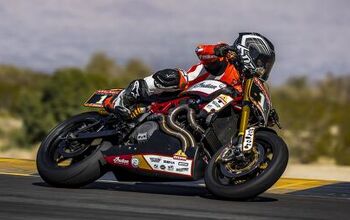
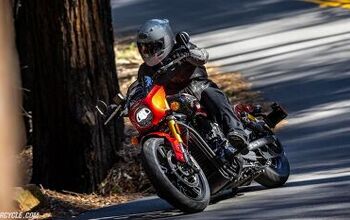
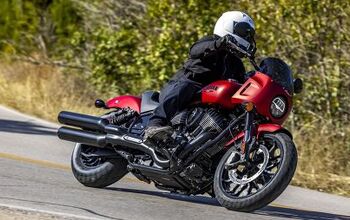
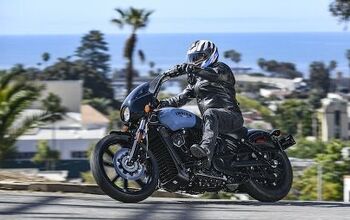
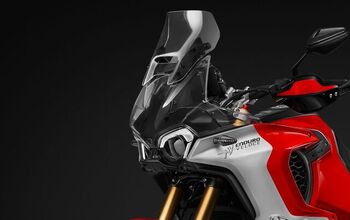
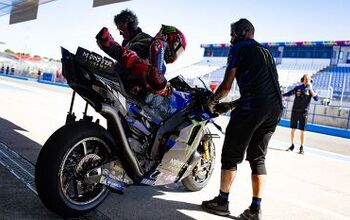

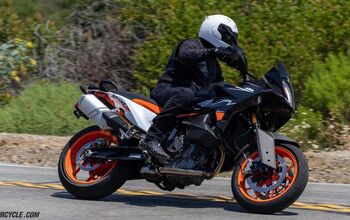
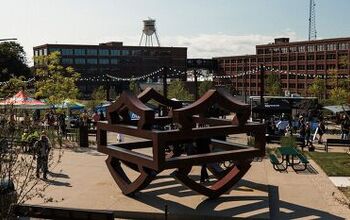

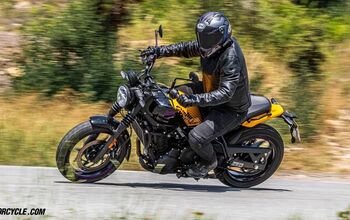
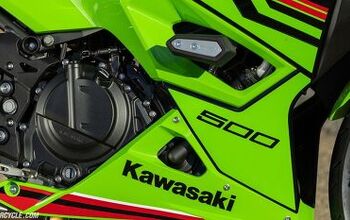


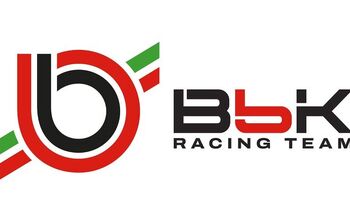
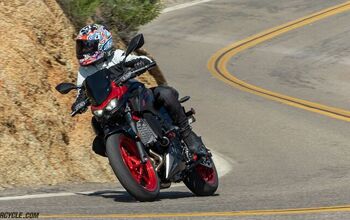

Comments
Join the conversation
Diavel and Rocket from Triumph is money more wisely spent.
Burns, dude, how does it make you feel, Man? Eh? Is you happy and satisfied? Or would an FTR 1000S itch that scratch...
Talk to me about soul, Brother!